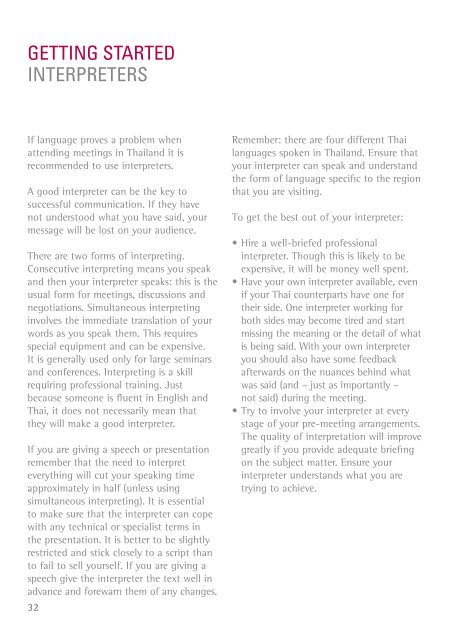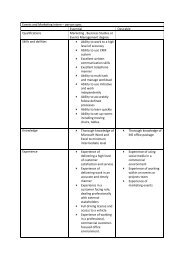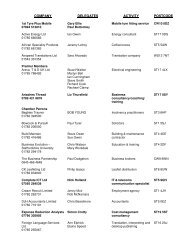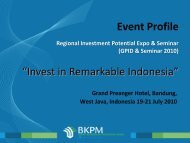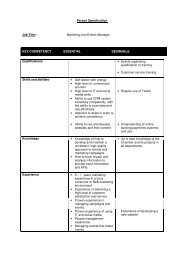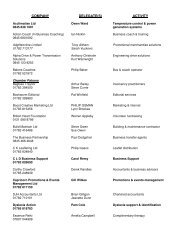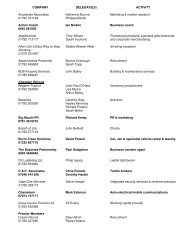Thailand Business Guide - UK Trade & Investment
Thailand Business Guide - UK Trade & Investment
Thailand Business Guide - UK Trade & Investment
You also want an ePaper? Increase the reach of your titles
YUMPU automatically turns print PDFs into web optimized ePapers that Google loves.
GETTING STARTED<br />
INTERPRETERS<br />
If language proves a problem when<br />
attending meetings in <strong>Thailand</strong> it is<br />
recommended to use interpreters.<br />
A good interpreter can be the key to<br />
successful communication. If they have<br />
not understood what you have said, your<br />
message will be lost on your audience.<br />
There are two forms of interpreting.<br />
Consecutive interpreting means you speak<br />
and then your interpreter speaks: this is the<br />
usual form for meetings, discussions and<br />
negotiations. Simultaneous interpreting<br />
involves the immediate translation of your<br />
words as you speak them. This requires<br />
special equipment and can be expensive.<br />
It is generally used only for large seminars<br />
and conferences. Interpreting is a skill<br />
requiring professional training. Just<br />
because someone is fluent in English and<br />
Thai, it does not necessarily mean that<br />
they will make a good interpreter.<br />
If you are giving a speech or presentation<br />
remember that the need to interpret<br />
everything will cut your speaking time<br />
approximately in half (unless using<br />
simultaneous interpreting). It is essential<br />
to make sure that the interpreter can cope<br />
with any technical or specialist terms in<br />
the presentation. It is better to be slightly<br />
restricted and stick closely to a script than<br />
to fail to sell yourself. If you are giving a<br />
speech give the interpreter the text well in<br />
advance and forewarn them of any changes.<br />
32<br />
Remember: there are four different Thai<br />
languages spoken in <strong>Thailand</strong>. Ensure that<br />
your interpreter can speak and understand<br />
the form of language specific to the region<br />
that you are visiting.<br />
To get the best out of your interpreter:<br />
• Hire a well-briefed professional<br />
interpreter. Though this is likely to be<br />
expensive, it will be money well spent.<br />
• Have your own interpreter available, even<br />
if your Thai counterparts have one for<br />
their side. One interpreter working for<br />
both sides may become tired and start<br />
missing the meaning or the detail of what<br />
is being said. With your own interpreter<br />
you should also have some feedback<br />
afterwards on the nuances behind what<br />
was said (and – just as importantly –<br />
not said) during the meeting.<br />
• Try to involve your interpreter at every<br />
stage of your pre-meeting arrangements.<br />
The quality of interpretation will improve<br />
greatly if you provide adequate briefing<br />
on the subject matter. Ensure your<br />
interpreter understands what you are<br />
trying to achieve.


